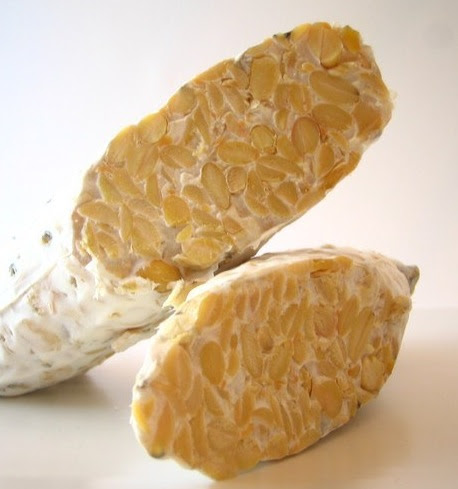Tempeh offers much more health benefits than conventional soy products.
Tempeh is fermented soybean, originating from the Java island of Indonesia. The soybeans, which are first soaked and de-hulled, are slightly cooked to bind into a cake-like form. The cooked beans are then cultured with a mold called Rhizopus oligosporus. The texture becomes gritty, and the taste more pronounced — rich, nutty, and chewy.
READ MORE: Orbit Gum Is Pretty Dangeous
Because tempeh is fermented, it is not only easier to digest, but beneficial to your gut health, as it increases your healthy-bacteria count. Tempeh offers the same probiotic benefits as products such as yogurt, sauerkraut, and pickles.
The preparation of tempeh makes the soy protein as minimally processed as possible, which is another reason why it is a much healthier soy protein to consume. Western cultures, which have been augmenting their soy intake in attempt to mimic the traditional Asian diet-, fail to recognize that Asian cultures consume primarily fermented soy — such as miso, tempeh, and natto — which is why these populations reap the benefits from soy that Western cultures do not.
Soybeans, being legumes, contain phytic acid, a concentrated storage of Phosphorus. Such high concentration of acid is indigestible to humans and animals (a key issue addressed in the controversial debate of soy) and thus, its presence in the human body may lead to malabsorption of minerals such as calcium, iron, and zinc. Tempeh, being a fermented soy protein, however, contains 45% lower phytate levels. This means that you will absorb more calcium, iron, and zinc, than you would from ingesting unfermented soy.
Also, because tempeh is a concentrated, fermented-soy protein, one serving offers significantly more protein, fiber, and vitamin content than soy products such as tofu and soy milk would. The holistic nature of tempeh also offers greater cardiovascular benefits, as the proteins found in fermented soy, glycinin and conglycinin, are broken down by molds, yeasts, and bacteria into fragments which have antioxidant, anti-inflammatory, and blood pressure-lowering properties. Studies have shown that increased consumption of fermented soy, such as tempeh, improves blood fats, lowering LDL cholesterols (“the bad cholesterol”) and triglycerides.
The cultured state of tempeh also indicates its increased levels of vitamin K; one vitamin K-trace specifically, menaquinone-7 (MK-7), has been proven to prevent elderly Japanese women’s hip fractures, strengthening bone health.
Although conventional soy products (provided they are organic and non-GMO verified) still offer nutritional value, it is the fermentation of soy which enhances soy’s biochemical attributes.
For more information about tempeh and fermented soy, see here and here.









